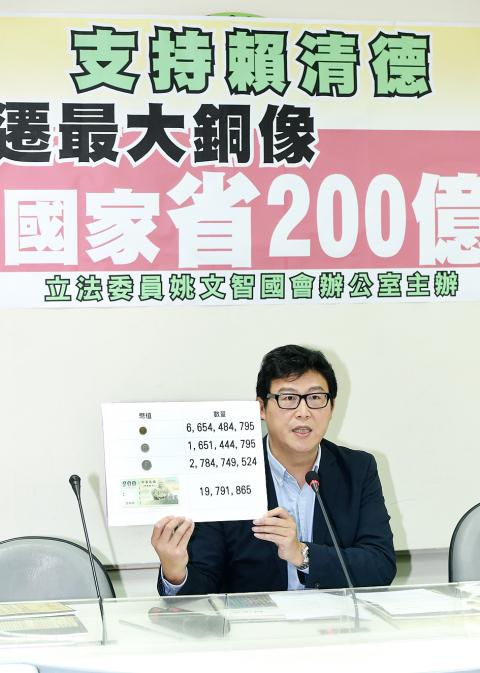The removal of statues of Chiang Kai-shek (蔣介石) from school campuses in Tainan has elicited the Chinese Nationalist Party’s (KMT) ire, but Democratic Progressive Party (DPP) Legislator Pasuya Yao (姚文智) yesterday proposed removing all statues of Chiang nationwide and replacing the former president’s image on coins and the NT$200 bill.
The Tainan City Government took action on Saturday after Tainan Mayor William Lai (賴清德) called for the removal of all statues of Chiang from school campuses in the city.
Following KMT Tainan city councilors’ denunciation yesterday of the removals, the KMT legislative caucus also took Lai to task for “taking down the statues sneakily at night during the weekend,” urging Lai to “stop manufacturing hatred.”

Photo: Lo Pei-der, Taipei Times
KMT deputy caucus whip Liao Kuo-tung (廖國棟) said schools are supposed to be autonomous on this issue and there are different perspectives from which historical figures are assessed.
“History is history; education is education,” Liao said, adding that the educational environment should not be marred by historical controversy.
KMT Legislator Chen Shu-hui (陳淑慧) called Lai’s order to remove the statues without consulting school principals, teachers or parents an “authoritarian” move.
In stark contrast to the KMT, Yao, who also held a press conference yesterday, called for an expansion of Lai’s policy to a complete sweeping away of statues of Chiang nationwide.
Yao showed copies of court verdicts on which Chiang had added his own comments and altered the sentences to executions.
It would be shameful for Taiwan if it did not remove the statues and currency commemorating a dictator, Yao said.
He voiced his support for Lai’s removal of the statues, calling it the beginning of a move to end hatred and proposed moving the largest statue of Chiang in Taipei, the one at the Chiang Kai-shek Memorial Hall, to the Cihu Mausoleum in Taoyuan’s Dasi District (大溪區).
“It’s not like we are throwing it into the ocean; those who wish to pay tribute to him can still visit Cihu,” Yao said, adding that the memorial hall without the statue could be transformed into a branch of the National Palace Museum to help solve the museum’s overcrowding problem.
Yao also proposed having the NT$1, NT$5 and NT$10 coins and the NT$200 bill, which all have an image of Chiang on them, recalled and replaced.
Chiang’s image on the money should be replaced by that of people who would help society better understand Taiwan’s democratic history, such as Chen Cheng-po (陳澄波), a renowned Taiwanese painter executed by the KMT regime in 1947, or Deng Nan-jung (鄭南榕), who in 1989 set himself ablaze to protest against the regime’s repression of freedom of speech, Yao said.
Chuang Chu Yu-nu (莊朱玉女), a woman who sold meals for NT$10 for decades to help low-income families, who passed away earlier this month, would also be an option, Yao said.
A Department of Issuing official at the central bank, who declined to be named, said yesterday that the bank has no comment on the issue.
Additional reporting by Amy Su

CHAOS: Iranians took to the streets playing celebratory music after reports of Khamenei’s death on Saturday, while mourners also gathered in Tehran yesterday Iranian Supreme Leader Ayatollah Ali Khamenei was killed in a major attack on Iran launched by Israel and the US, throwing the future of the Islamic republic into doubt and raising the risk of regional instability. Iranian state television and the state-run IRNA news agency announced the 86-year-old’s death early yesterday. US President Donald Trump said it gave Iranians their “greatest chance” to “take back” their country. The announcements came after a joint US and Israeli aerial bombardment that targeted Iranian military and governmental sites. Trump said the “heavy and pinpoint bombing” would continue through the week or as long

TRUST: The KMT said it respected the US’ timing and considerations, and hoped it would continue to honor its commitments to helping Taiwan bolster its defenses and deterrence US President Donald Trump is delaying a multibillion-dollar arms sale to Taiwan to ensure his visit to Beijing is successful, a New York Times report said. The weapons sales package has stalled in the US Department of State, the report said, citing US officials it did not identify. The White House has told agencies not to push forward ahead of Trump’s meeting with Chinese President Xi Jinping (習近平), it said. The two last month held a phone call to discuss trade and geopolitical flashpoints ahead of the summit. Xi raised the Taiwan issue and urged the US to handle arms sales to

State-run CPC Corp, Taiwan (CPC, 台灣中油) yesterday said that it had confirmed on Saturday night with its liquefied natural gas (LNG) and crude oil suppliers that shipments are proceeding as scheduled and that domestic supplies remain unaffected. The CPC yesterday announced the gasoline and diesel prices will rise by NT$0.2 and NT$0.4 per liter, respectively, starting Monday, citing Middle East tensions and blizzards in the eastern United States. CPC also iterated it has been reducing the proportion of crude oil imports from the Middle East and diversifying its supply sources in the past few years in response to geopolitical risks, expanding

Pro-democracy media tycoon Jimmy Lai’s (黎智英) fraud conviction and prison sentence were yesterday overturned by a Hong Kong court, in a surprise legal decision that comes soon after Lai was jailed for 20 years on a separate national security charge. Judges Jeremy Poon (潘兆初), Anthea Pang (彭寶琴) and Derek Pang (彭偉昌) said in the judgement that they allowed the appeal from Lai, and another defendant in the case, to proceed, as a lower court judge had “erred.” “The Court of Appeal gave them leave to appeal against their conviction, allowed their appeals, quashed the convictions and set aside the sentences,” the judges